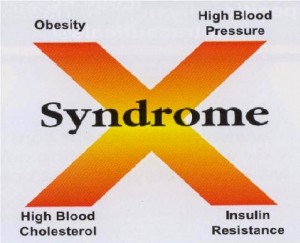
Do you have Syndrome X? Read on to find out and to learn what you can do about it.
By John L. Stump, DC, PhD, EdD
The first time you’ve heard this term used was in your Chiropractor’s office today. But that’s not a surprise because today blood sugar and weight issues are very prevalent in any doctor’s office. The first time I used it was 20 years ago after reading an article in a medical journal about unexplained overweight patients. In that article the author was trying to explain what “metabolic syndrome” is and how it functions in your body. It is as malicious and as destructive as it sounds. It’s also more prevalent than you might think.
It affects more than 35 percent of adults in the U.S., that’s more than one third of all adults in the United States, about as widespread as the common cold or acne but much more destructive. The damaging issue with the metabolic syndrome is the fact that it can put you at risk for a heart attack or worse a stroke.
To be more specific, metabolic syndrome is medically defined as a combination of high blood pressure, excess fat around the waist, high blood sugar, high triglycerides, and low levels of high-density lipoproteins (HDL). If you have any three of the group, you have metabolic syndrome.
Together, these conditions increase one’s risk for heart disease, stroke, type 2 diabetes, stress, and/or psychiatric problems. Typically you would be inactive and have a poor diet.
Your Gut Health
Metabolic syndrome and gut health go hand in hand. A person conceals over 100 trillion microbes in their intestines, and these organisms interact with your body to help regulate your body —including metabolism. If something goes wrong with the gut environment the rest of the body will suffer.
Unfortunately, the Standard American Diet (SAD) wreaks havoc on the gut health of millions of Americans. You like most Americans inadvertently cause this yourself by consuming poor choice foods. Thought many doctors don’t really know the mechanism of how poor or good gut flora interacts with the delicate metabolic process. People have inadvertently declared war on their microbiome, bombarding their system with foods that kill off good bacteria while allowing harmful varieties to thrive. Though most don’t fully understand how gut flora interact with the delicate metabolic processes, disruptions to normal healthy flora can have divesting effects on body metabolism. While processed, nutrient-stripped, poor quality food may seem good they don’t feed the microbes that are necessary for optimal health. This in turn prevents the metabolic system from doing its job, leading to the negative wellness effects we have discussed.
As a Chiropractor, acupuncturist and sports injury specialist I have seen poor nutrition from every aspect over my 40 years of practice. I know that in every corner of the world I have been, good health and wellness begins with a nutrient-rich diet designed to support the gut microbiome.
Because dietary changes can be challenging, you may need coaching, and help and a consistent follow up to maintain long term wellness. For this reason we stand with you for we have helped hundreds over this hump. In six months you won’t believe how much better you can feel after getting this syndrome under control and it starts with your food and diet.
Focus on Fiber
With the correct diet in place, the symptoms of metabolic syndrome will fade within six months if the diet and recommendations are followed. This means following a healthy plant-based diet during the time, one rich in vitamins, minerals, healthy fats and fiber. Fruits and vegetables provide plenty of the fiber needed to move things through the colon, stabilize your blood sugar, support healthy digestion and elimination, and feed your microbiome.
To help you get started and stick to a good wellness rich diet I have included some guidelines to follow:
Eat more of the following:
- Lots of dark leafy greens and a bright rainbow of a variety of colored vegetables.
- Free-Range Poultry and fresh whole eggs.
- Wild caught fish and seafood.
- Unrefined, cold-pressed olive oil, coconut oil and almond oil.
- Fresh real butter from grass-fed cows.
Eat or consume none of the following:
- Refined Sugar.
- Refined flour, white bread, pastries, cookies and crackers, etc.
- Refined oils (soybean, canola, sunflower, etc.)
- Fast foods.
- Sodas and soft drinks.
- Alcohol and Tobacco
Eat limited amounts of the following: (No more than twice each week)
- Grains and dairy.
- Fruits or fresh fruit juice.
- Farm raised fish.
- Limited organic grass-fed red meat.
This is just an outline, your doctor may wish to have a more strict diet or a less strict diet depending on your A-1C results from your blood test. You will find the above outline also helps you sleep better, lose weight, look better and reduce your risk of cardiovascular involvement of things like heart attack and stroke.
Transform your intestines faster with whole food supplements
While diet will make the big difference, we will expedite things by providing you with high-quality whole food supplements, not synthetic, poor quality supplements that many get from their health food or drug store. We will provide only the needed and the best supplements to speed up your recovery time, thus saving you time, money and misery.
For example, we’ll start with a Trace Mineral Analysis (TMA) and a blood test (A1-C) to see where you are on the nutrition scale. More than likely one of the first supplements you may need is a probiotic, that’s the benefit of doing a TMA, you can see on an objective scale of what you are high or low in and get it corrected faster than trying to guess. We can usually correct high blood sugar, insulin resistance and metabolic syndromes, like syndrome x, quite rapidly if the patient is willing and cooperative.
We also, encourage you to work with your family doctor or your GP to monitor your needs. A healthy, plant-based diet can change your life, and may even allow you to reduce your medications. Always tell your GP the changes that are being made in your nutrition program.
This is a slow process and requires very diligent work by both doctor and patient but I have seen thousands of Syndrome X patients become happy former Syndrome X patients!
